Pool Maintenance in Dubai's Climate: A Year-Round Guide to Keeping Your Pool Perfect
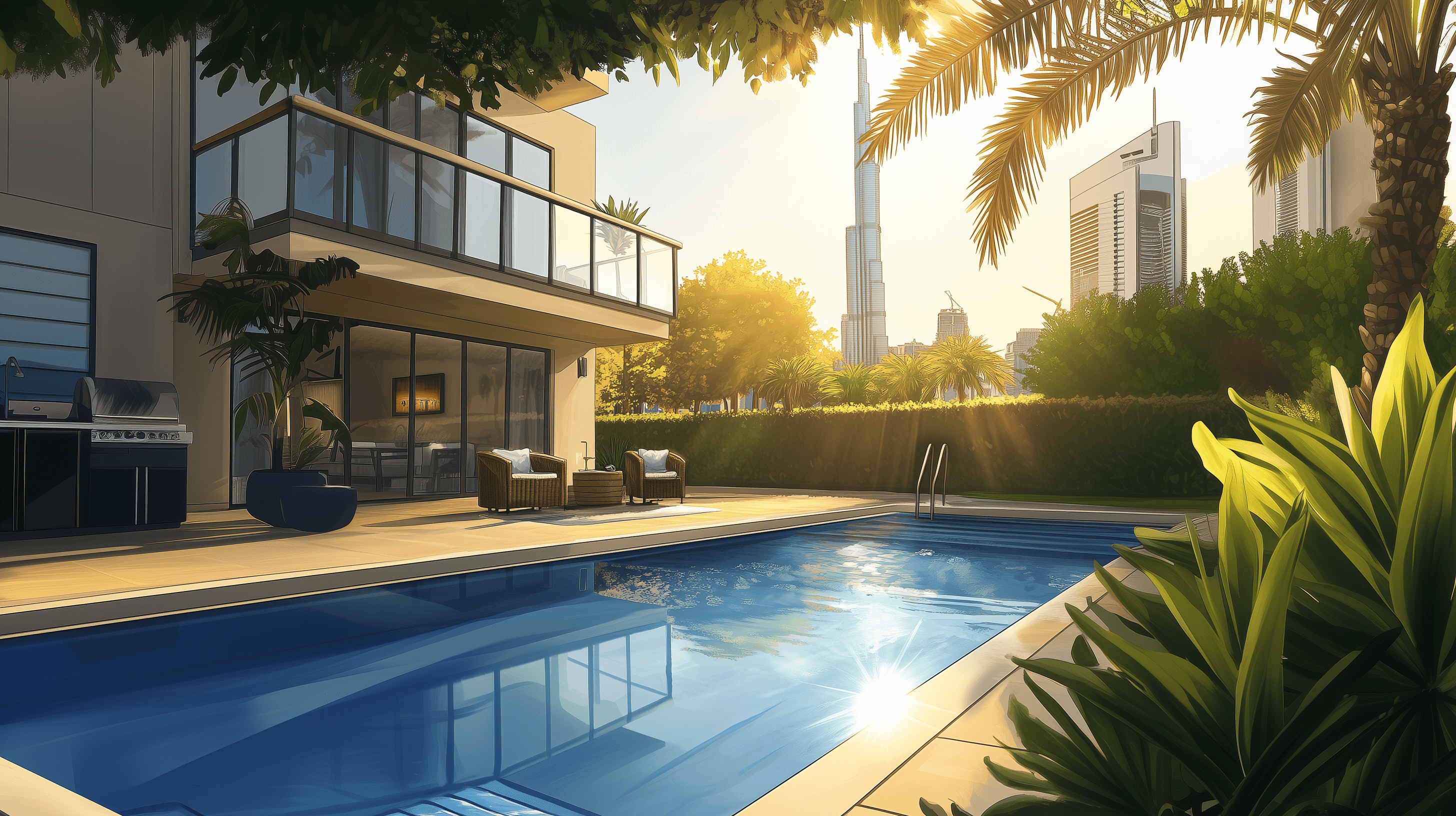
Here's what most Dubai pool owners discover the hard way: maintaining a pool in 45°C heat isn't just about keeping the water clean - it's about fighting evaporation rates that can drain thousands of litres monthly, chemical imbalances that turn your backyard oasis into an expensive headache, and dust storms that can fill your pool with sand overnight.
Whether you're reading this whilst enjoying your pool during December's perfect weather (and wondering why the water feels chilly without heating), sweating through August maintenance challenges, or planning ahead for next year's pool care routine, understanding how Dubai's extreme climate affects every aspect of pool maintenance determines whether your investment remains a source of joy or becomes a constant battle against the elements.
The reality is stark: pool maintenance schedules that work anywhere else in the world simply don't apply in Dubai. When UV radiation breaks down chlorine faster than you can add it, when sandstorms deposit enough debris to clog filtration systems in hours, and when evaporation rates exceed what most pool owners ever imagine possible, you need maintenance strategies specifically designed for one of the world's most challenging climates for pool ownership.
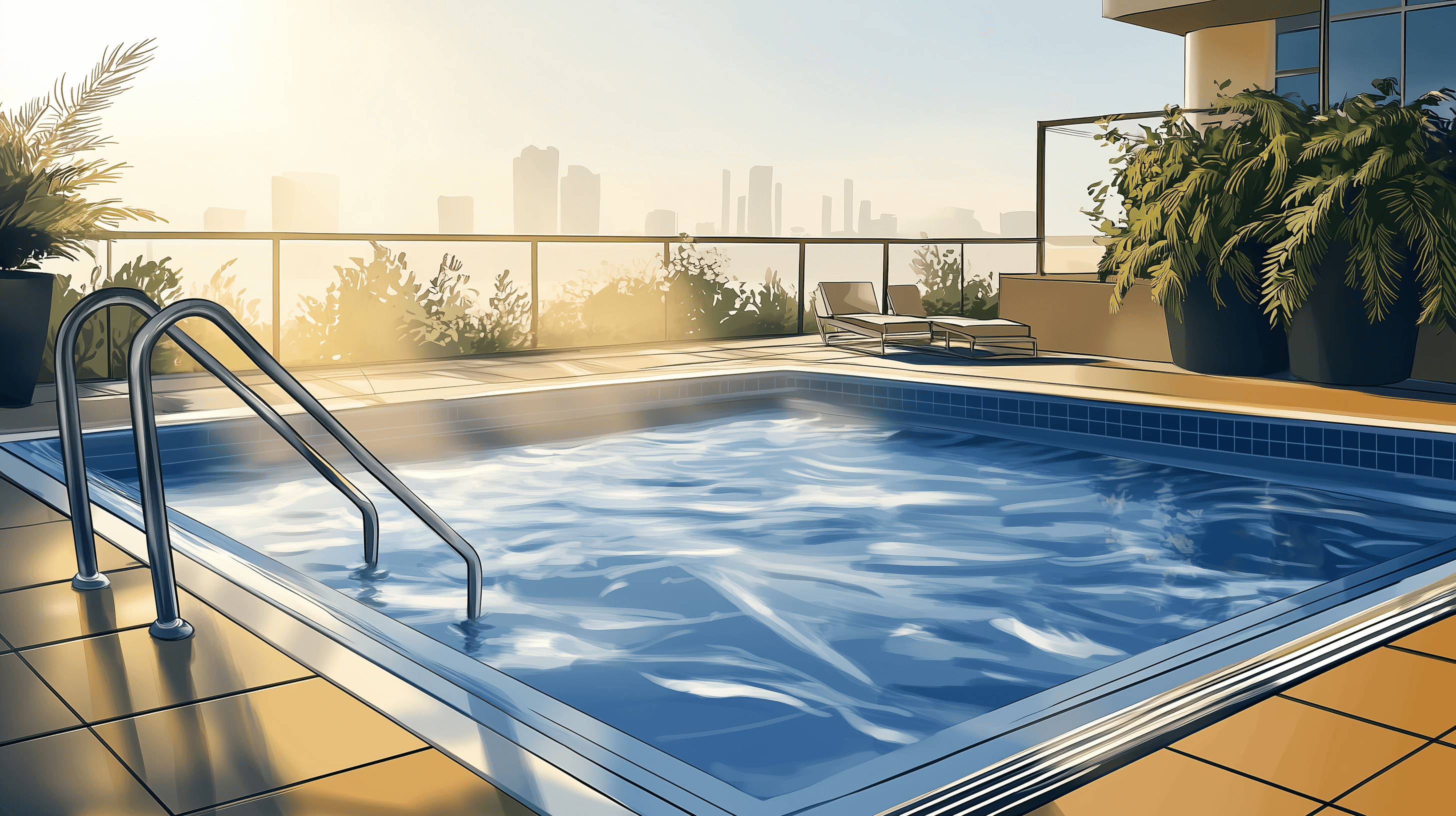
Understanding Dubai's Unique Pool Maintenance Challenges
Dubai's climate creates maintenance demands unlike anywhere else in the world. The combination of extreme heat, intense UV radiation, frequent dust storms, and dramatic temperature swings between seasons requires completely rethinking traditional pool care approaches.
During summer months, pool water temperatures can reach 35°C without cooling systems, creating an environment where bacteria and algae can bloom within hours if chemical levels falter. The intense UV radiation breaks down chlorine at accelerated rates, requiring more frequent chemical additions and constant monitoring to maintain safe swimming conditions.
Winter brings different challenges. While temperatures moderate, Dubai's beautiful outdoor weather during December through February coincides with pool water that drops to uncomfortably cold 18-22°C without heating. Many families discover they want to use their pools most during these pleasant months, but maintenance routines must adapt to different chemical consumption patterns and equipment operation schedules.
Dust storms present year-round challenges that can overwhelm unprepared pool owners. A single significant dust event can deposit enough sand and debris to cloud pool water for days and stress filtration systems beyond their normal capacity. Understanding how to prepare for and recover from these events becomes essential for Dubai pool ownership.
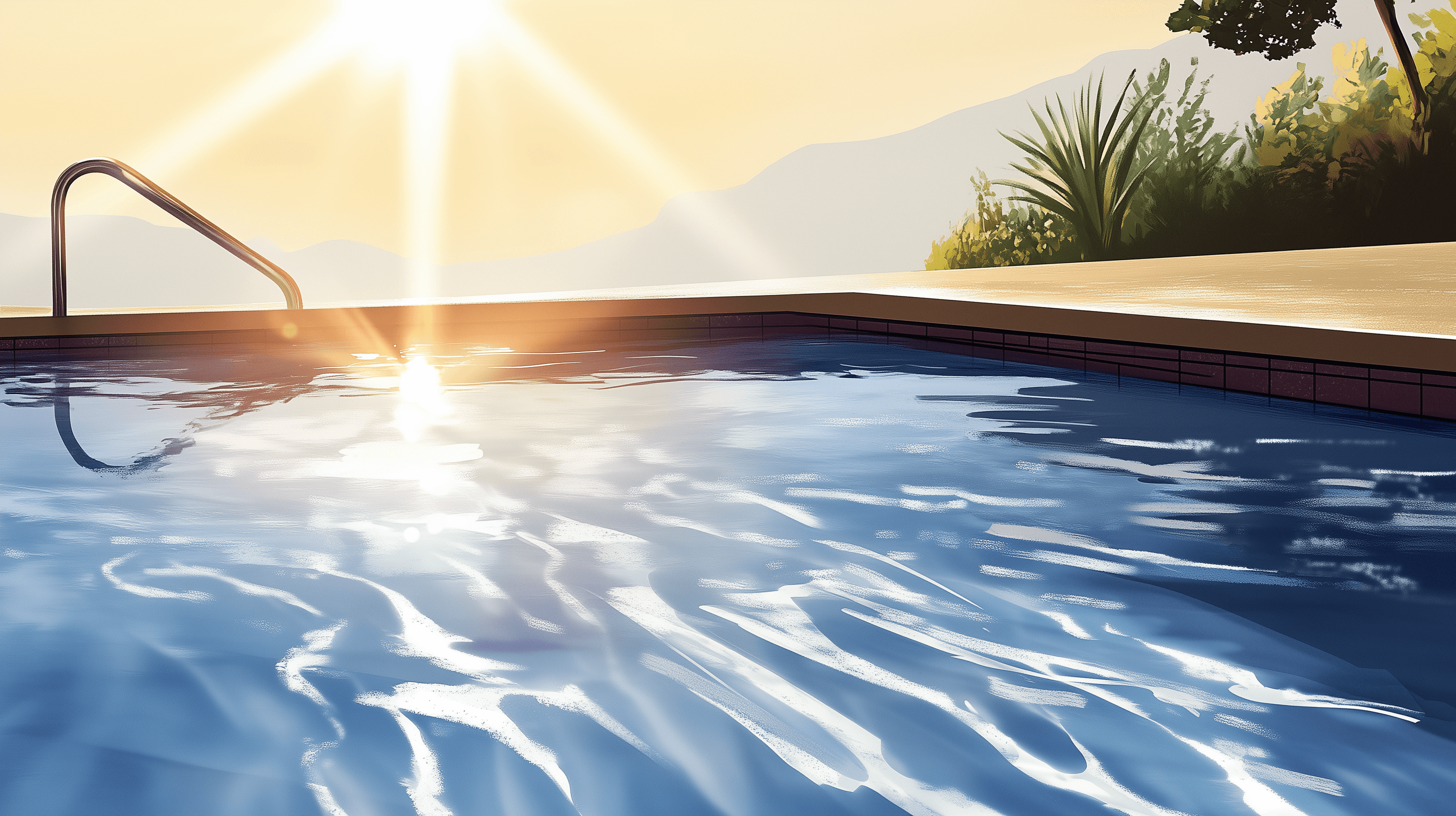
Summer Maintenance: Surviving the Heat (May-October)
Summer maintenance in Dubai requires aggressive strategies to combat extreme temperatures, intense UV radiation, and minimal rainfall that might naturally refresh pool chemistry.
Daily Chemical Management
During peak summer months, chlorine consumption accelerates dramatically due to UV breakdown and higher water temperatures that increase chemical reaction rates. Free chlorine levels that might remain stable for days in temperate climates can drop to unsafe levels within 12-24 hours in Dubai's summer conditions.
Test chlorine and pH levels daily during summer months, preferably in early morning before UV exposure begins affecting readings. Target chlorine levels of 2-4 ppm become even more critical when temperatures exceed 40°C and bather loads increase due to families seeking relief from the heat.
pH levels require particular attention since high temperatures accelerate pH drift. Maintain pH between 7.2-7.6, testing twice daily during extreme heat periods. pH levels above 7.8 reduce chlorine effectiveness significantly, whilst levels below 7.0 can cause equipment corrosion and swimmer discomfort.
Cyanuric acid (stabiliser) becomes crucial during summer months to protect chlorine from UV destruction. Maintain levels between 30-50 ppm, though some Dubai pool professionals recommend the higher end of this range during peak UV exposure periods.
Cooling System Maintenance
Heat pump and chiller systems work overtime during summer months, requiring enhanced maintenance attention to ensure reliable operation when needed most. Clean condenser coils monthly during dust-heavy periods, as accumulated sand and debris dramatically reduce efficiency and can cause system failures during peak demand.
Check refrigerant levels and electrical connections regularly, as thermal cycling from extreme temperature variations can affect system components. Schedule professional service before summer heat peaks to ensure systems operate efficiently throughout the demanding season.
Monitor system runtime and energy consumption to identify developing problems before they cause failures. Systems running constantly may indicate insufficient capacity, refrigerant leaks, or heat exchange problems that require professional attention.
Enhanced Filtration Requirements
Dubai's summer dust requires running circulation pumps longer than typical recommendations. While standard advice suggests 8-12 hours daily, Dubai conditions often require 12-16 hours during dusty periods to maintain water clarity and chemical distribution.
Backwash sand filters more frequently during summer months, potentially weekly during heavy dust periods compared to monthly schedules that work in cleaner environments. Cartridge filters may require cleaning every 3-5 days instead of weekly intervals.
Consider upgrading to variable-speed pumps that can run longer hours at lower speeds, maintaining circulation whilst managing energy costs. These pumps often provide better value than standard pumps in Dubai's demanding conditions.
Water Level Management
Evaporation during Dubai summers reaches extreme levels that shock new pool owners. A typical residential pool can lose 5-10 centimetres of water weekly during peak summer, requiring regular top-ups to maintain proper skimmer operation and equipment protection.
Monitor water levels daily during summer months, as rapid evaporation can expose skimmer intakes and damage circulation pumps. Automatic water levelling systems prove invaluable for maintaining consistent levels without constant attention.
Consider evaporation reduction strategies such as liquid solar covers or physical pool covers during extreme heat periods. Even reducing evaporation by 30-40% significantly impacts both water consumption and chemical replacement costs.
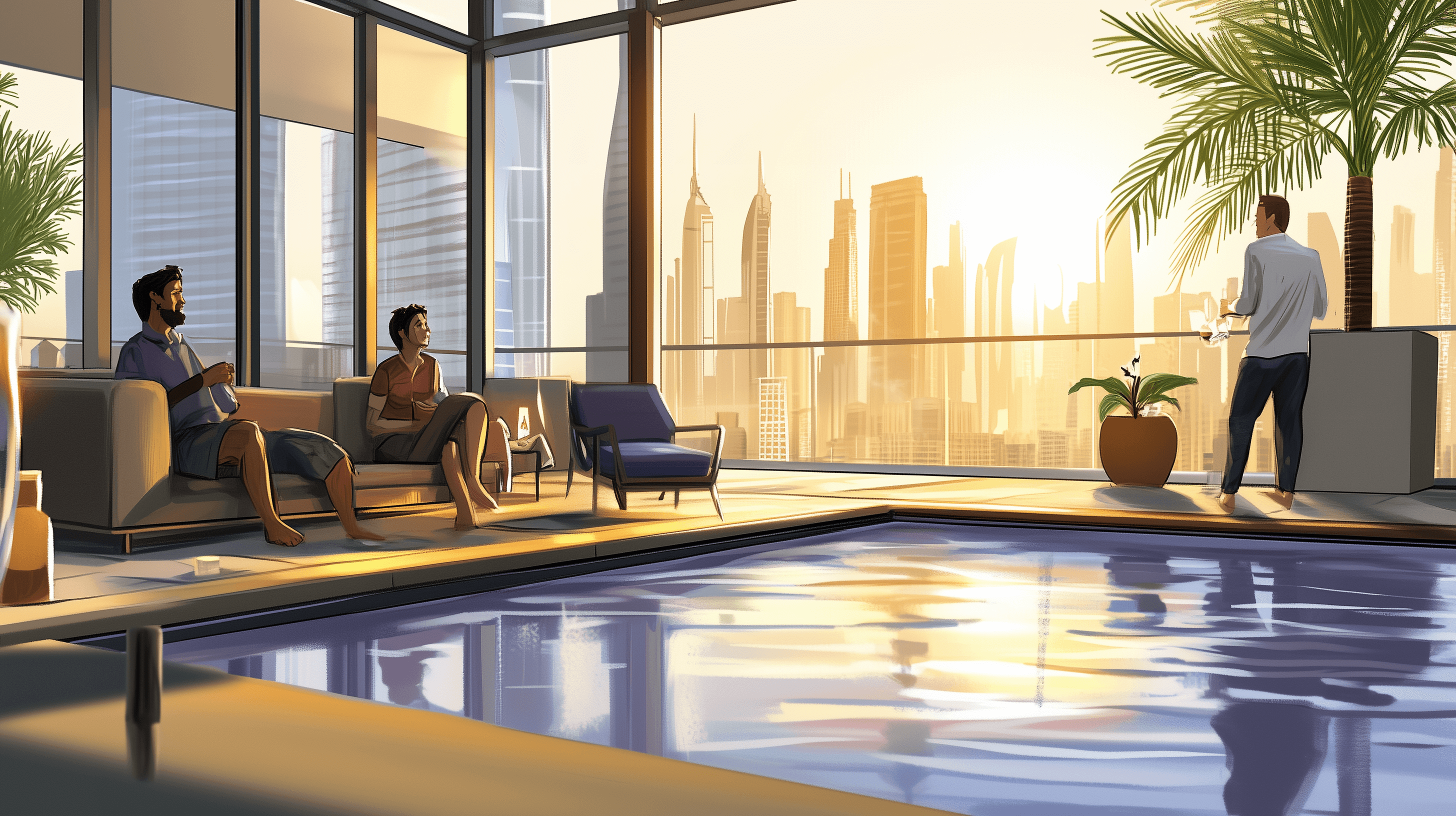
Winter Maintenance: Maximising Beautiful Weather (November-March)
Dubai's winter months present the year's most pleasant outdoor weather but require adapted maintenance strategies for different chemical consumption patterns and equipment operation schedules.
Temperature Management
Winter pool maintenance centres around heating systems that make pools comfortable during Dubai's beautiful outdoor weather. Without heating, pool water drops to 18-22°C during December-February, rendering pools unusable precisely when outdoor conditions are perfect for swimming.
Heat pump systems require different maintenance attention during winter operation. Clean air filters monthly as dust accumulation affects heating efficiency. Monitor heating costs and runtime to identify developing issues such as refrigerant leaks or component wear.
Consider thermal pool covers during winter months to retain heat overnight and reduce heating costs. Covers can reduce heat loss by 50-70%, significantly lowering energy consumption whilst maintaining comfortable swimming temperatures.
Reduced Chemical Consumption
Lower water temperatures during winter months slow chemical reaction rates and reduce chlorine consumption. However, maintain testing schedules to ensure proper balance, particularly as heating systems can affect pH levels through equipment interaction and water circulation patterns.
UV radiation remains significant during Dubai's clear winter days, though reduced compared to summer intensity. Maintain stabiliser levels whilst potentially reducing chlorine addition frequency based on actual consumption testing.
Monitor pH drift patterns with heating systems operating, as some equipment affects water chemistry through materials interaction or circulation changes.
Equipment Winterisation
Unlike temperate climates requiring freeze protection, Dubai's "winterisation" involves optimising systems for different operational demands. Heating systems operate extensively, cooling systems remain idle, and circulation requirements may reduce due to lower bather loads and chemical consumption.
Service heating systems before winter begins to ensure reliable operation throughout the peak usage season. Clean heat exchangers, check electrical connections, and verify control system operation.
Maintain cooling systems in standby condition with periodic operation to prevent seal drying and component degradation. Even monthly brief operation helps maintain system readiness for early spring heat.
Maximising Usage During Perfect Weather
Winter maintenance strategies should support increased pool usage during Dubai's most pleasant months. Many families discover they use pools more during winter when outdoor temperatures are comfortable for extended poolside activities.
Maintain heating schedules that support spontaneous pool use. Many systems benefit from maintaining base temperatures even when pools aren't in immediate use, as heating pools from ambient temperature requires significant energy and time.
Consider enhanced lighting for longer evening usage during winter months when outdoor dining and entertaining peak. Ensure all safety and operational lighting functions properly for extended hours of pool area use.
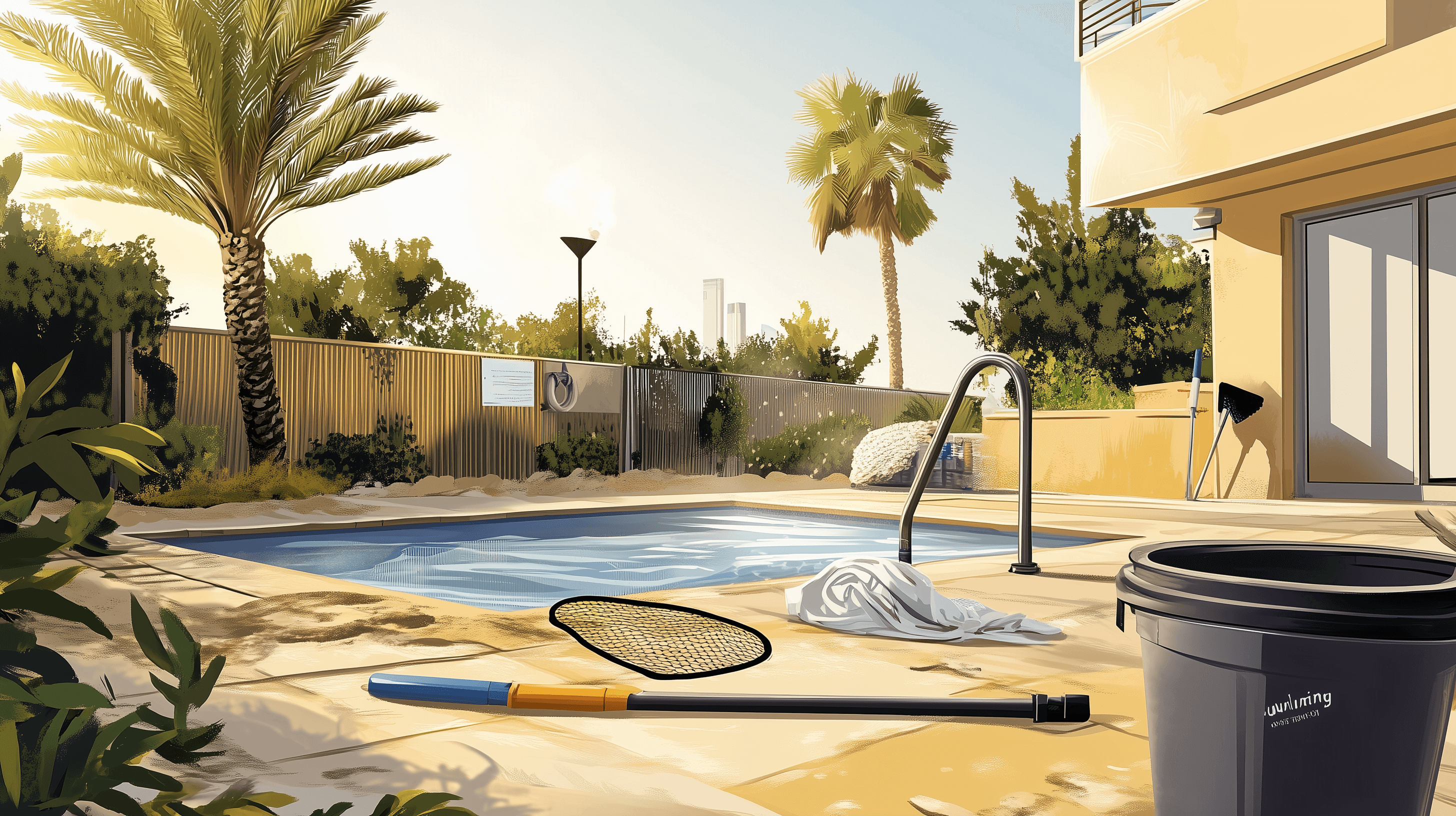
Dust Storm Preparation and Recovery
Dubai's dust storms can transform crystal-clear pools into muddy lagoons within hours, requiring specific strategies for preparation and recovery that many pool owners learn through expensive experience.
Pre-Storm Preparation
Weather monitoring becomes essential for Dubai pool owners. When dust storms are forecast, cover pools if possible or prepare for extensive cleaning and filtration system stress.
Superchlorinate pools before anticipated dust events, ensuring chlorine levels are at the higher end of safe ranges (3-4 ppm) to combat increased organic load from debris.
Clean skimmer and pump baskets immediately before storms to maximise debris collection capacity. Overfull baskets can reduce circulation when pools need maximum filtration capability.
During Storm Management
Resist the temptation to run filtration systems during active dust storms, as overwhelming debris loads can damage equipment and reduce effectiveness. Allow storms to pass before beginning recovery operations.
If systems must operate during storms, monitor pump baskets every few hours and clean as necessary to prevent circulation restrictions that can damage equipment.
Keep pool areas clear of equipment and accessories that might become projectiles or suffer damage from blowing sand and debris.
Post-Storm Recovery
Begin recovery with manual removal of large debris using nets and skimmers before relying on circulation systems. Attempting to filter excessive debris immediately can overwhelm systems and extend recovery time.
Vacuum pools manually rather than using automatic systems until water clarity improves. Automatic systems can stir up settled debris and reduce filtration effectiveness.
Expect multiple days of enhanced filtration and possible water replacement for severe dust events. Budget for increased chemical consumption during recovery periods as debris breakdown affects water chemistry.
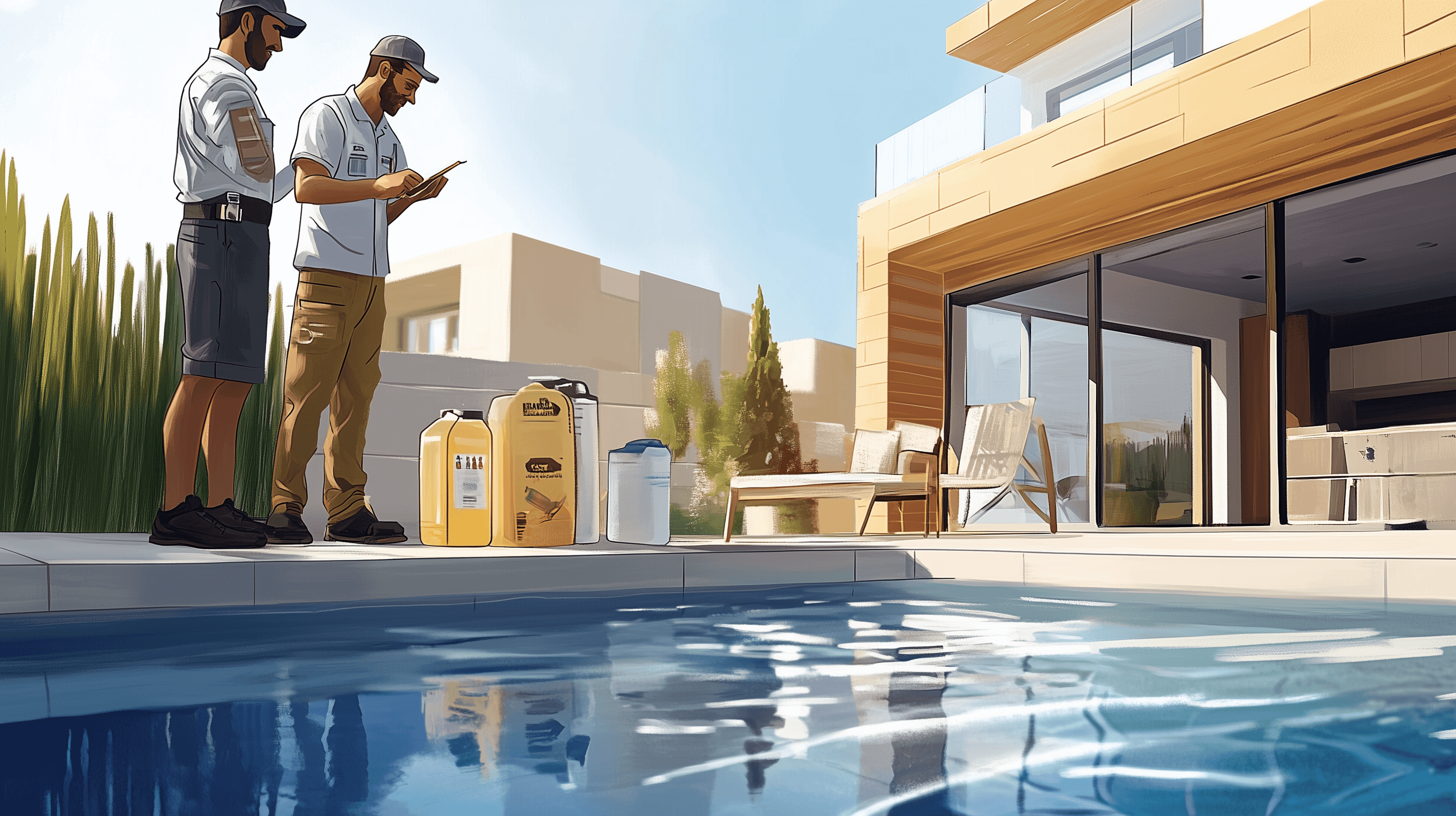
Professional vs. DIY Maintenance in Dubai
The decision between professional maintenance services and DIY approaches requires careful consideration of Dubai's unique challenges and the substantial consequences of maintenance failures in extreme conditions.
Professional Service Benefits
Professional pool maintenance services in Dubai typically understand local climate challenges and adapt their routines accordingly. Experienced services monitor chemical consumption patterns specific to Dubai conditions and adjust treatment schedules based on seasonal demands.
Quality services provide emergency response during extreme weather events, equipment failures during peak summer heat, or rapid water chemistry changes that can occur during dust storms. This support proves invaluable when immediate intervention prevents expensive problems.
Professional services typically cost AED 400-800 monthly depending on service frequency and pool size. Many Dubai residents find this investment worthwhile given the complexity of maintaining proper conditions in challenging climate whilst managing busy lifestyles.
Services often include equipment maintenance, chemical balancing, debris removal, and emergency support that would be difficult and time-consuming for homeowners to manage independently.
DIY Maintenance Considerations
Dedicated homeowners can maintain pools independently but must understand Dubai-specific requirements that differ significantly from standard maintenance advice. Chemical consumption rates, equipment demands, and environmental stresses require adapted approaches.
DIY maintenance requires investment in quality testing equipment, understanding of chemical interactions in extreme temperatures, and availability during critical periods such as dust storms or equipment failures.
Chemical costs for DIY maintenance typically range from AED 200-500 monthly depending on pool size and seasonal demands. However, this doesn't include equipment replacement, emergency repairs, or the value of time invested in maintenance activities.
Success requires commitment to daily testing during extreme conditions, understanding of equipment operation and maintenance, and ability to respond quickly to changing conditions that can affect water quality rapidly.
Hybrid Approaches
Many Dubai pool owners adopt hybrid approaches that combine professional expertise with homeowner involvement. Professional services might handle complex chemical balancing, equipment maintenance, and emergency response whilst homeowners manage daily testing and basic cleaning.
This approach often provides cost savings whilst ensuring expert intervention during challenging periods or when specialised knowledge becomes necessary.
Professional consultation for equipment sizing, chemical program development, and seasonal adjustments can support successful DIY maintenance whilst providing backup support when needed.
Equipment Maintenance in Extreme Conditions
Dubai's climate places extraordinary demands on pool equipment that require enhanced maintenance schedules and preventive approaches to avoid failures during peak usage periods.
Circulation System Care
Pool pumps work harder in Dubai conditions due to extended runtime requirements and increased debris loads. Monitor pump baskets daily during dusty periods and weekly during cleaner conditions to prevent circulation restrictions.
Lubricate pump seals and check impeller condition more frequently than standard recommendations. Heat and debris accelerate wear on moving components, making preventive replacement more economical than emergency repairs.
Variable-speed pumps prove particularly valuable in Dubai conditions, allowing extended circulation at lower speeds to manage debris whilst controlling energy costs. However, they require understanding of proper speed programming for different seasonal conditions.
Filtration System Optimisation
Sand filters require more frequent backwashing in Dubai conditions, potentially weekly during dusty summer periods compared to monthly intervals common elsewhere. Monitor pressure gauges and backwash when pressure rises 25% above clean levels.
Consider sand media replacement every 18-24 months instead of typical 3-5 year intervals due to increased debris loads and chemical exposure accelerating media breakdown.
Cartridge filters may require replacement every 3-6 months in Dubai conditions compared to annual replacement common in cleaner environments. Rotate multiple cartridge sets to extend lifespan through proper cleaning and drying cycles.
Heat Exchange Equipment
Heating and cooling system heat exchangers require enhanced maintenance due to dust accumulation and thermal cycling stresses.
Our Check Trusty Experts advise to:
- Clean condenser coils monthly during dusty periods using appropriate cleaning solutions and techniques.
- Monitor refrigerant levels more frequently as thermal cycling and vibration from extreme temperature variations can affect system seals and connections.
- Schedule a professional heat exchanger inspection annually to identify developing issues such as scale buildup, corrosion, or efficiency losses that affect system performance and energy consumption.
Chemical Management Strategies
Successful pool chemistry in Dubai requires understanding how extreme conditions affect chemical behaviour and adjusting management strategies accordingly.
Here's a few insights and actions that might help you understand and manage this better...
Chlorine Management in High UV
UV radiation intensity in Dubai destroys chlorine rapidly, requiring different approaches than standard pool chemistry recommendations. Maintain higher initial chlorine levels (3-4 ppm) during peak UV periods rather than lower maintenance levels common in temperate climates.
Consider using stabilised chlorine products specifically formulated for high UV environments. These products provide longer-lasting residual levels that better handle Dubai's intense sun exposure.
Monitor cyanuric acid levels carefully, as excessive stabiliser can reduce chlorine effectiveness whilst insufficient levels allow rapid chlorine destruction. Target levels of 40-50 ppm during peak summer periods.
pH Control in Extreme Heat
High water temperatures accelerate pH drift, requiring more frequent monitoring and adjustment. Test pH twice daily during extreme heat periods and maintain tight control between 7.2-7.6 for optimal chemical effectiveness.
Use appropriate pH adjustment products designed for high-temperature applications. Some standard products may be less effective or require larger quantities in extreme heat conditions.
Consider automated pH control systems for pools experiencing rapid pH changes, particularly during summer months when manual adjustment becomes time-consuming and critical for swimmer safety.
Shock Treatment Protocols
Regular shock treatments become more critical in Dubai conditions due to increased organic loads from dust, higher bather loads seeking relief from heat, and accelerated chemical consumption.
Shock pools weekly during summer months and after dust storms, using appropriate shock products for high-temperature applications. Some shock products lose effectiveness in extreme heat or may require enhanced dosages.
Perform shock treatments during evening hours to maximise effectiveness and prevent UV destruction of treatment chemicals before they can provide intended benefits.
Seasonal Transition Strategies
Moving between Dubai's distinct seasons requires adjusted maintenance approaches that prepare systems and water chemistry for changing conditions.
Summer-to-Winter Transition (October-November)
As temperatures moderate, gradually adjust chemical dosing schedules to account for reduced consumption rates. Maintain testing frequency whilst potentially reducing chlorine addition based on actual consumption patterns.
Begin heating system preparation with professional service to ensure reliable operation throughout winter months. Clean heat exchangers, check electrical connections, and verify control system calibration.
Adjust circulation schedules as dust loads typically reduce during cooler months. Consider reducing daily runtime whilst maintaining adequate circulation for chemical distribution and filtration.
Winter-to-Summer Transition (March-April)
Prepare cooling systems for summer operation with professional service and testing. Clean condenser coils, check refrigerant levels, and verify control system operation before heat demands arrive.
Gradually increase chemical dosing schedules as temperatures rise and UV exposure intensifies. Begin enhanced chlorine monitoring before peak conditions arrive to prevent chemistry problems.
Inspect and clean all equipment before peak demand periods. Replace worn components, update consumables, and ensure backup equipment availability for critical summer months.
Cost Planning for Dubai Pool Maintenance
Understanding maintenance costs specific to Dubai conditions helps homeowners budget appropriately for year-round pool ownership.
Professional Service Investment
Professional maintenance services range from AED 400-800 monthly depending on service frequency, pool size, and seasonal demands. Many services adjust pricing seasonally to reflect increased chemical consumption and equipment demands during summer months.
Emergency service availability during extreme conditions often justifies professional service costs, particularly given the potential for rapid water quality deterioration or equipment failures during peak heat.
Consider seasonal service contracts that include equipment maintenance, chemical programs, and emergency response rather than basic cleaning-only services that may prove inadequate for Dubai conditions.
DIY Cost Considerations
Chemical costs for DIY maintenance typically range from AED 200-500 monthly, with higher consumption during summer months and after dust events. Budget for enhanced chemical usage compared to temperate climate recommendations.
Equipment replacement and maintenance costs run higher in Dubai conditions due to accelerated wear from heat, UV exposure, and increased debris loads. Budget for pump seals, filter media, and component replacement more frequently than standard recommendations.
Testing equipment investment becomes more critical for DIY maintenance in Dubai, requiring quality meters and test kits that function reliably in extreme conditions and provide accurate readings for critical decisions.
Seasonal Budget Variations
Expect 40-60% higher costs during summer months due to increased chemical consumption, enhanced equipment demands, and potential emergency service needs during extreme conditions.
Winter heating costs typically add AED 200-600 monthly depending on desired temperature levels and heating system efficiency. However, chemical costs often decrease during moderate temperature periods.
Plan for dust storm recovery costs including enhanced chemical usage, possible water replacement, and equipment service after severe events. These irregular but significant expenses require budget contingency planning.
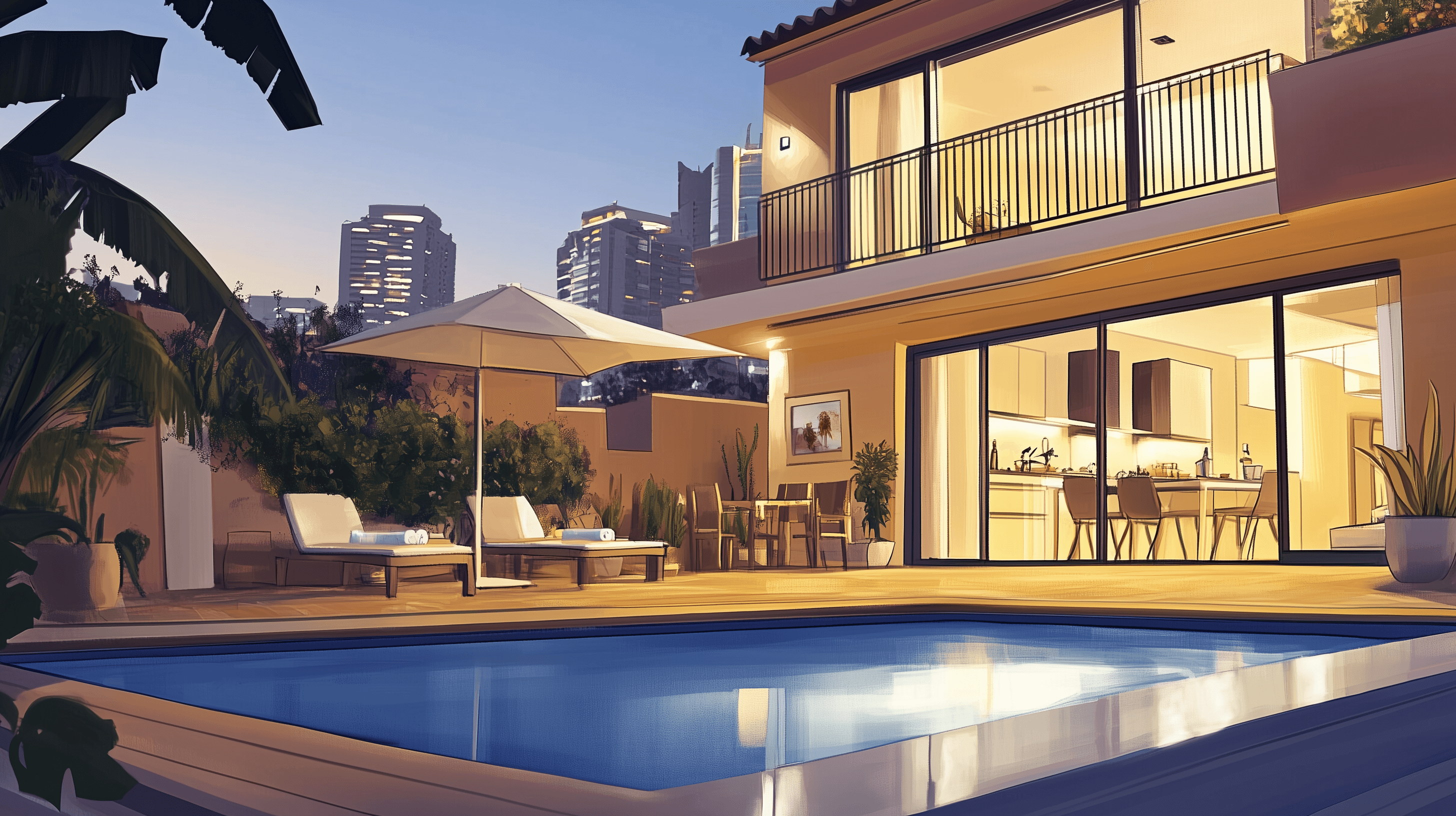
Technology and Automation Benefits
Modern pool automation and monitoring technology provide particular advantages for Dubai pool maintenance by addressing the rapid changes and intensive demands of extreme climate conditions.
Automated Chemical Systems
Salt chlorine generators and automated chemical dosing systems prove particularly valuable in Dubai conditions where chemical consumption rates vary dramatically with weather conditions and seasonal changes.
These systems provide consistent chemical levels despite rapid consumption and can adjust dosing based on monitored conditions rather than relying on homeowner testing and manual adjustment.
Consider systems with remote monitoring capabilities that alert homeowners to problems developing during travel periods or extreme weather when immediate intervention prevents expensive recovery operations.
Smart Monitoring Systems
Pool monitoring technology that tracks temperature, chemistry, and equipment operation provides early warning of developing problems before they become expensive failures or safety issues.
Remote monitoring proves particularly valuable during dust storms or extreme heat when traditional testing becomes difficult or dangerous whilst conditions change rapidly.
Systems that provide historical data help identify patterns and optimise maintenance schedules specific to individual pools and usage patterns in Dubai conditions.
Energy Management
Smart pool controls that optimise equipment operation based on time-of-use electricity rates, weather conditions, and usage patterns can significantly reduce operating costs whilst maintaining proper conditions.
These systems prove particularly valuable for managing heating and cooling costs by operating equipment during optimal efficiency periods whilst maintaining desired comfort levels.
Integration with home automation systems allows coordination between pool equipment and other home systems for optimal energy management during peak demand periods.
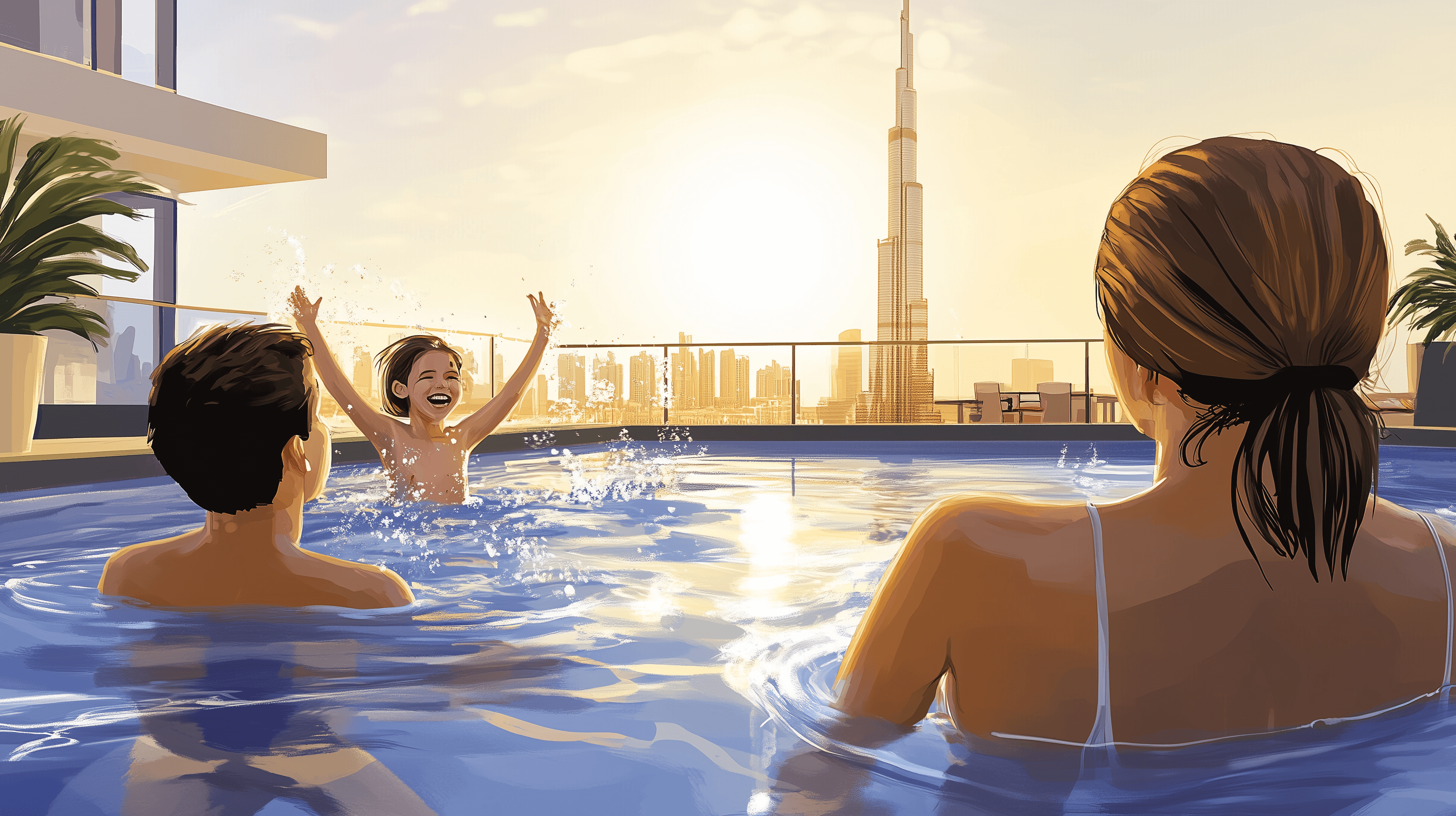
Conclusion: Mastering Dubai Pool Maintenance
Successful pool maintenance in Dubai requires understanding that standard pool care advice simply doesn't apply in one of the world's most challenging climates for pool ownership. From chemical consumption rates that double during summer months to equipment demands that exceed any manufacturer's standard recommendations, Dubai pool ownership demands adapted strategies and enhanced attention to detail.
The rewards justify the effort. Properly maintained pools provide year-round family enjoyment, from refreshing relief during summer's extreme heat to comfortable swimming during winter's beautiful outdoor weather. Understanding seasonal demands, preparing for environmental challenges, and choosing appropriate service levels ensures your pool investment delivers the lifestyle benefits that motivated your original decision to build.
Whether you choose professional maintenance services that understand Dubai's unique demands or commit to DIY approaches adapted for extreme conditions, success requires recognising that Dubai pool maintenance isn't just more intensive than elsewhere - it's fundamentally different.
Ready to ensure your Dubai pool receives the specialised care it needs to thrive in our extreme climate?
Check Trusty connects you with verified pool installation experts like Pools by Design, Exterior Space Landscape Works and Secret Gardens - professionals who understand that maintaining pools in Dubai requires expertise, dedication, and approaches specifically developed for our unique environmental challenges.
Your pool investment deserves maintenance strategies that work when conditions get tough. Whether you're planning maintenance approaches for a new installation or seeking to improve care for an existing pool, experienced professionals ensure your pool provides reliable enjoyment regardless of what Dubai's climate delivers.
Whether you're currently managing summer's extreme demands, planning maintenance improvements during winter's pleasant weather, or preparing strategies for next year's challenges, understanding Dubai-specific maintenance requirements ensures your pool remains a source of joy rather than frustration throughout our demanding climate.

